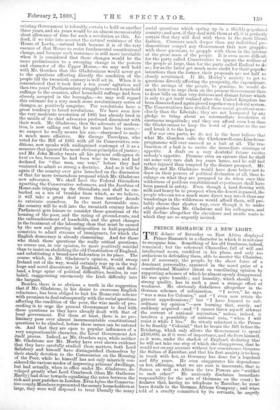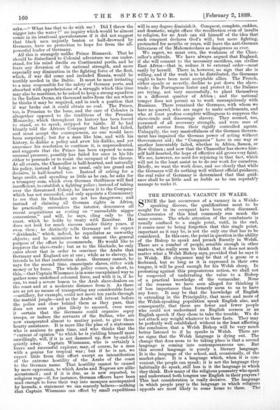PRINCE BISMARCK IN A NEW LIGHT.
THE debate of Saturday on East Africa displayed Prince Bismarck in a character in which it is not easy to recognise him. Something of his old frankness, indeed, 'remained; but the vehement Chancellor, full of will and intellectual scorn, confident in his plans, and only too audacious in defending them, able to master the Chamber, and if necessary, the people, by the sheer force of a dominant personality, appeared in the novel guise of a constitutional Minister intent on conciliating opinion by supporting schemes of which he almost openly disapproved. He was quite humble ; And. humility, which should be a strong quality, has in such a man a strange effect af weakness. He obviously disbelieves altogether in the German schemes of colonisation. "I never," he says, "was a man for Colonies," and "I even now retain the gravest apprehensions ;" but "I have learned to sub- ordinate my opinion "—new learning that, surely, and suddenly acquired—and "I cannot throw myself athwart the current of national aspiration," unless, indeed, it. involves a possibility of national ruin, "when I will resist it while I live." So utterly reluctant is the Prince to be frankly "Colonial," that he treats the Bill before the Reichstag, which only allows the Government to spend £100,000, as if it were of importance, and shelters himself, as it were, under the shadow of England, declaring that he will not take one step of which she disapproves, that he would not on any account without her concurrence threaten the Sultan of Zanzibar, and that his first anxiety is to keep in touch with her, as Germany has done for a hundred and fifty years. He even exaggerates his dependence on her, affirming, what we are sure is inaccurate, that in Samoa as well as Africa the two .Powers are "-wedded to each other:" He anxiously disclaims immediate responsibility for the acts of Germans on the coast ; he declares that, having no telephone to Zanzibar, he must leave details to the German African Company ; and when told of a cruelty committed by its servants, he angrily . asks,—" What has that to do with me ? Did I throw the nigger into the water ?" an inquiry which would be almost comic in its irrational querulousness if it did not suggest that black men unjustly beaten or half-drowned by Germans, have no protection to hope for from the all- powerful leader of Germany. All this is strangely unlike Prince Bismarck. That he should be disinclined to Colonial adventure we can under- stand, for his mind dwells on Continental perils, and he fears any diversion of the national strength, and more especially any diminution in the fighting force of the fleet, which, if war did come and included Russia, would be terribly needed in the Baltic. It must be most irritating to a man responsible for the safety of German ports, and absorbed with apprehensions of a struggle which this time may also be maritime, to be asked to keep a strong squadron in the Indian Ocean, six thousand miles from the sea where he thinks it may be required, and in such a position that if war broke out it could obtain no coal. The Prince, too, is Prussian to the bone, and the care of Colonies is altogether opposed to the traditions of the Prussian Monarchy, which throughout its history has been forced to stand, so to speak, stripped for battle. If he had bluntly told the African Company that they had failed, and must accept the consequences, no one would have been surprised ; but for a man like him, and with his history, to dislike a policy and avow his dislike, and yet announce his resolution to continue it, is unprecedented, and suggests that the Prince has been exposed to some unusual pressure, possibly has failed for once in his life either to persuade or to resist the occupant of the throne. At all events, the Chancellor is half-hearted, and naturally his policy, instead of being, as usual, only too grand and decisive, is half-hearted too. Instead of asking for a large credit, and spending as little as he can, he asks for a, trumpery sum, which even German thriftiness will find insufficient, to establish a fighting police ; instead of taking over the threatened Colony, he leaves it to the Company which has not succeeded, and only appoints a Commissary to see that its blunders are not too dangerous ; and instead of claiming all German rights in Africa, he practically surrenders the interior, denounces all recent acquisitions as resting on "unreadable nigger concessions," and will, he says, cling only to the coast, which he holds by treaty with Zanzibar. He does not look for much success under thirty years, if even then ; he distinctly tells Germany not to expect 4‘ dividends," which, indeed, he repudiates as unworthy objects ; and he minimises to the utmost the general purpose of the effort he recommends. He would like to suppress the slave-trade ; but as to the blockade, he only cares about that in order to convince the Arabs that Germany and England are at one ; while as to slavery, he intends to let that institution alone. Germany cannot, he says for the second time, emancipate slaves, either with money or by force. The whole policy comes, in short, to this,—that Captain Wissmann is in some unexplained. way to gather some undefined coloured force, and with it is, if he can, to read a severe lesson to the Arab slave-dealers on the coast and at a. moderate distance from it. As there are as yet no means of transporting any considerable force —artillery, for example, could, not move ten yards through the matted jungle—and as the Arabs will retreat before the police and close behind them as they pass, that does not seem a plan likely to succeed, even were it certain that the Germans could organise sepoy troops, or induce the servants of the Sultan, who are now exasperated almost to mutiny point, to give them hearty assistance. It is more like the plan of a statesman who is anxious to gain time, and who thinks that the "current of opinion "to which he is yielding himself most unwillingly, will, if it is not dammed up, flow by-and-by quietly away. Captain Wissmann, who is certainly a brave and. successful explorer, may, of course, be a man with a genius for tropical war; but if he is not, we expect little from this effort except an intensification of the extreme hostility of the Arabs of the coast to the German name. That hostility cannot be caused by mere oppression, to which Arabs and Negroes are alike accustomed ; and if it is due, as is now reported, to religious rage—if, for instance, German officers have been mad enough to force their way into mosques accompanied by hounds, a statement we can scarcely believe—nothing that Captain Wissmann can effect by small expeditions will in any degree diminish it. Conquest, complete, sudden, and dramatic, might efface the recollection even of insults to religion, for no Arab can rid himself of the idea that such conquest declares God's will ; but mere fighting, protracted for months or years, will leave the anti-German bitterness of the Mahommedans as dangerous as ever. We regret, we must own, the weakness of the Chan- cellor's attitude, We have always argued that England, if she will consent to the necessary sacrifices, can civilise East Africa—that is, reduce it to external order—most easily by herself. There is, however, no sign that she is willing, and if the work is to be distributed, the Germans ought to have been most acceptable allies. The French, either openly or secretly, decline to put down the slave- trade ; the Portuguese foster and protect it ; the Italians are trying, not very successfully, to plant themselves in a different quarter of Africa ; and the national temper does not permit us to work unsuspiciously with Russians. There remained the Germans, with whom we have no quarrel, who are eager to make settlements, and who at least profess complete willingness to suppress the slave-trade and discourage slavery. They seemed, too, possessed of all necessary strength, and were sure of faithful service from their rigidly controlled agents. Unhappily, the very masterfulness of the German Govern- ment has impaired the German power of acting without Government aid ; the " Companies " have in one way or another lamentably failed, whether in Africa, Samoa, or New Guinea ; and now that the Chancellor has shown him- self half-hearted, the hope of effective aid grows very faint. We see, however, no need for rejoicing in that fact, which will not in the least assist us to do our work for ourselves. Briefly, we want the work done, and see clearly that while the Germans will do nothing well without official guidance, the real ruler of Germany is determined that that guid- ance shall be as little and as feeble as he can reputaVy manage to make it.



































 Previous page
Previous page